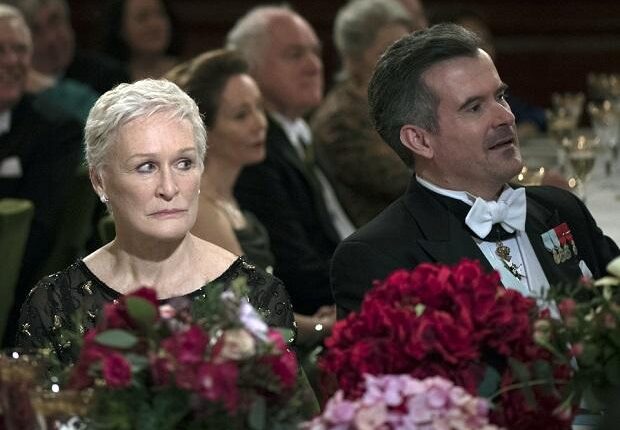
Lies, damn lies and books
At the Academy Awards on Sunday night no one will be surprised if Glenn Close walks away with the Oscar for best actress for her role in The Wife. The 71-year-old actress is outstanding as Joan Castleman, the wife of a celebrated author who has just won the Nobel Prize in Literature. Joan is the copybook helpmeet — devoted ally and personal assistant rolled into one. She is a loving wife, mindful of her husband’s health and his smallest needs, picking up after him and even signalling to him discreetly at parties when his beard gets festooned with crumbs. After they get the happy news, she submits to jumping up and down on the bed with her jubilant husband who chants, “I won the Nobel, I won the Nobel.”
But as the movie unspools, you realise that Joan is much more than an everywife (spoiler alert here!). Joseph Castleman’s literary works are not his own. She is the writer, he is not. She has the gift, he does not. And for decades, she has subsumed her literary identity into her husband’s fictive one and gilded him with the gold of her own talent. In short, Joseph is a fraud, and the Nobel Prize really belongs to his wife.
However, despite Close’s magnificently nuanced portrayal of a woman who is at last beginning to splinter under the strain of her exploitative marriage, The Wife, based on Meg Wolitzer’s 2003 novel of the same name, is an improbable story. A literary genius who lets her philandering husband appropriate the fruits of her talent? And she does it not with one book or for a few years, but over a lifetime? And with such cunning secrecy that not even her children get to know?
It simply isn’t credible. Besides, The Wife ups the volume on the same old dirge of the woman obliterating herself on the altar of her marriage and family. When a brilliant, gifted, 20th-century female character is shown to be so self-abnegating and slavish towards her egotistic, douchebag husband for the better part of her life, the cultural cues that go out are medieval, to say the least.
To me, the interesting part of The Wife (apart from Close’s performance) is Joseph’s dishonesty, whose entire writing career rests on a lie. It brings to mind a host of real life writers who have had a rather ardent relationship with lies. In a stunning exposé earlier this month, The New Yorker detailed how Dan Mallory, the book editor-turned-author of the bestselling novel The Woman in the Window, routinely treated his friends and colleagues to a fantastical web of falsehoods about himself. These included his claims of holding a doctorate from Oxford and being a cancer survivor who suffered debilitating relapses of the disease. (After the report came out, Mallory claimed he was bipolar, often with no recollection of what he may have said earlier.)
While Mallory’s fabrications are creepy, they aren’t exactly criminal. Others have threaded the dishonesty into their work — hoaxing, plagiarising, misrepresenting. There’s the famous case of Clifford Irving, who in the early 1970s, got a huge advance for a “ghost-written” autobiography of billionaire-recluse Howard Hughes before it was outed as a fraud; there’s James Frey’s 2003 memoir, the bestselling A Million Little Pieces, which was later trashed as a falsified account of his struggles with drug addiction; there’s Kaavya Vishwanathan, then a student at Harvard, who plagiarised her 2006 chick-lit novel from multiple books in that genre; and there are journalists who have dreamed up gritty human interest stories and done breathtaking “on-field” reportage without going anywhere near said field. In 1981, The Washington Post reporter Janet Cooke’s Pulitzer Prize-winning feature about an eight-year-old heroin addict was found to have been, well, cooked up. Cooke lost the Pulitzer.
Psychologists say that liars tend to be more creative, that their imagination is more supple and unfettered. Does that give creative people a sort of poetic licence to fib? Of course, there are fibbers and con artists in every profession, so the lies of writers can hardly be treated as pleasing bursts of their creativity. Most literary fraudsters do get taken down, they do come to grief.
But then, none of them had Joan for a wife.
source: Business Standard
